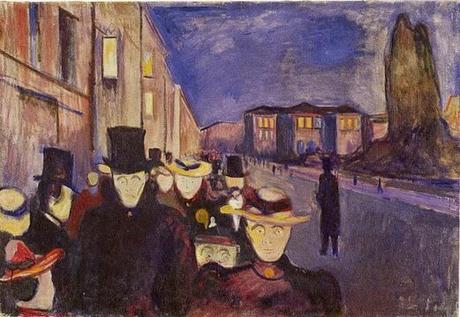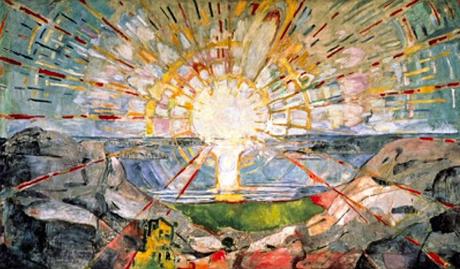As a dramatic poet, Ibsen stands next to Shakespeare and ancient Greek tragedians. His unique gift to particularise universals is unparalleled in modern drama, and while his characters are most believable and come alive on stage, his overall dramatic design transports his art into an almost cosmic dimension. Ibsen’s heroes and heroines enact eternal, archetypal dramas. In the realm of drama, he was an heir of great Greek tragedians and his Sophoclean economy of expression beats Shakespeare.
 "Evening on Karl Johan Street" by Edvard Munch
"Evening on Karl Johan Street" by Edvard MunchIbsen was greatly influenced by Hegel’s philosophy, and particularly by his Phenomenology of the Spirit. He was able to articulate Hegel’s philosophical thoughts in meaningful and artistic terms; he made his philosophy come alive (much as Wagner did with the philosophy of Schopenhauer). In his dramas, the dialectical action and development took precedence over character analysis, and any director who does not recognize this fails as Ibsen’s interpreter. Ibsen saw the world of everyday reality rather like Plato did in his allegory of the cave; we live in the world of falsehood and illusion, beyond which there is a world of universal reality. His mission was to strip that ‘veil of Maya’ and reveal the underlying fabric of the world in general, and human soul in particular. For this reason, Wilson Knight called his method a ‘spiritual strip-tease’.
Ibsen wrote Ghosts in 1881, during his long sojourn in Rome. Perhaps the ‘eternal city’ and his relative solitude, away from his native Norway, provided him with the necessary distance to see things clearly. Do we not see most clearly only from a distance? Let’s now transport ourselves to a large garden-room of Mrs Helen Alwing, the widow of Captain Alwing. Though the glass, a view of a gloomy fjord, half hidden by continual rain, can be made out. Almost immediately we are confronted with two worlds: one immediate and obvious, the other distant, murky and archetypal. By the end of the play we will have circumnavigate both.
Mrs Alving, rather like Clytemnestra in the Oresteia, is preparing for insincere memorial celebrations in the honor of her dead husband. This pious, all too pious woman had despised him for his debauchery and did all she could to shield her son from him and his way of life. Oswald, who is an artist and has led a life joy and pleasure abroad, returns to join his mother in the festivities. Unexpectedly, he tells her about his fear of having a fatal disease, a disease which the doctor in France had diagnosed as a ‘softening of the brain’. This is a euphemism for tertiary syphilis. With his artistic powers paralysed he feels doomed to end his life in a state of hopeless dependency. In many ways, Oswald is like his father – he loves life and now he is going to pay the price for it. It is not clear, whether he has inherited the disease from his father or not. In Act II he says: “If only it had been something I’d inherited – something I wasn’t to blame for...” In Act III, however, he says: “This disease that I have inherited – [he points to his forehead and goes very softly] is seated here.” Almost certainly, he has inherited his father’s life-loving temperament, and this can be a ‘sin’ in, what Nietzsche called, anti-life Christian morality. Osvald ironically quotes the Bible: “The sins of the fathers are visited on the children...” (Exodus: 2015). The dead have now returned to haunt!
In a moment of tragic peripeteia, Mrs. Alving realises that it was her anti-life view of reality that drove her husband to destruction. Now, her own son asks her to administer a poison to him, so that he does not have to live through a degrading illness. Rather like Orestes, he avenges his father but he does it not by killing his mother physically but by killing her through lodging a deep guilt in her heart. After the father has thus been avenged, there is a powerful invocation of the sun, rather like in Aeschylus’ The Libation Bearers. The ending of the play is ambiguous. We don’t know whether Helen Alving will give Osvald the poison or not.
 "The Sun" by Edvard Munch
"The Sun" by Edvard MunchHumanity has feared the return of the dead for millennia and this fear may be the origin of religious practice and myth. Elaborate burial and memorial practices, including binding of the dead body before burial and leaving precious objects by the dead body, were to prevent such return. Ibsen’s Ghosts deals with this very fear, which is metaphorically expressed by Osvald through his fear of having inherited his deadly condition (be it the disease itself, or his life-loving temperament) from his father.
Purely from the medical perspective, Mrs Alving should have had secondary syphilis for Osvald to have been infected with syphilis in utero. Of this there is no evidence in the play. He would have had a number of inborn mental and physical handicaps which he clearly does not have. In the recent production in London, directed by Richard Eyre, at the end of the play Osvald, previously looking completely normal and healthy, goes into some kind of syphilis triggered epileptic fit. This is quite unbelievable, and also an unnecessary distraction from a deeper meaning of the play. Regrettably, the director has concretised the metaphor.
